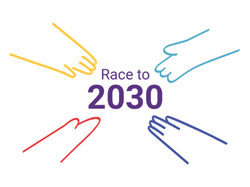Vaccines are the best way to prevent meningococcal meningitis. But in Africa’s meningitis belt, a string of 26 countries from Senegal and The Gambia in the west to Ethiopia in the east that suffers the highest global burden of the disease, effective vaccines have all-too-often been out of reach.
The 2010 introduction of MenAfriVac®—developed by Serum Institute of India, in partnership with PATH and the World Health Organization (WHO)—changed everything. MenAfriVac® is the groundbreaking affordable conjugate vaccine that virtually eliminated group A meningitis from the meningitis belt. This was a major public health achievement because group A meningitis was responsible for more than 80 percent of meningitis epidemics in Africa. But it was just the first step—because other deadly meningococcal meningitis serogroups (think “strain”) remained in circulation in Africa.
The tide is turning once again.
MenFive®, the first multivalent meningococcal conjugate vaccine (MMCV) to protect against the five predominant causes of meningococcal meningitis in the meningitis belt, received World Health Organization (WHO) prequalification in July 2023 and has the potential to eliminate meningococcal meningitis epidemics from Africa, once and for all. WHO prequalification is a critical achievement that confirms a vaccine meets strict international quality, safety, and efficacy standards and that allows it to be procured by United Nations agencies and Gavi, the Vaccine Alliance—thus reaching the people and communities most in need.
MMCVs aren’t new, though, and have been on the global market for years. What makes MenFive® so special?
MenFive® was built specifically for Africa
MenFive® - developed by Serum Institute of India Pvt. Ltd. (SIIPL) in partnership with PATH and with funding from the UK government’s Foreign, Commonwealth & Development Office - was designed specifically to meet the needs of African meningitis belt countries and help them control meningitis outbreaks.
Historically, African countries have dealt with meningococcal meningitis outbreaks via mass vaccination campaigns. These campaigns have relied on either low-cost polysaccharide vaccines or expensive MMCVs. Unfortunately, polysaccharide vaccines aren’t effective in young children and elicit only short-lived protection, even in older children and adults. This means communities have to be vaccinated each time an epidemic or outbreak strikes—an ultimately expensive and inefficient approach that puts a high burden on Africa’s already-stretched thin health systems and yields no sustainable progress toward epidemic control.
MMCVs are critical for meningitis control because they provide better, broader, longer lasting protection. And unlike polysaccharide vaccines, they can be delivered to children younger than 2 years of age and protect the unvaccinated via herd immunity. But currently available MMCVs are expensive to purchase, plus are available only in single-dose vials, which aren’t ideal for mass campaigns.
MenFive® is the exception. It protects against meningitis groups A, C, W, Y, and X will be much more affordable than existing licensed meningococcal vaccines - following in the legacy of MenAfriVac®, MenFive® will be available at a price African nations can afford.
Beyond cost, MenFive® also shows enhanced temperature stability, which means it will be able to be delivered outside of the cold chain for extended periods and can reach remote communities that would otherwise be left out of vaccination efforts. In addition, it’s provided in convenient 5-dose vials. By increasing the number of people who are vaccinated against the disease, especially in areas that have limited access to health services, we can prevent meningococcal meningitis from finding any foothold that could lead to a future outbreak or epidemic.
And, perhaps most notably, MenFive® is the only vaccine in the world that protects against group X meningococcal meningitis, which is increasingly implicated in African meningitis outbreaks. Even if other currently licensed MMCVs were to be introduced in Africa, countries would still be vulnerable to group X outbreaks. To truly eliminate African meningitis epidemics, we must target all significant disease-causing serogroups in circulation.
MenFive® is the gamechanger that can help us do just that.
Where do we go from here?
MenFive® is approved by WHO for use in people between 1 and 85 years of age and will prevent not just death from meningitis, but disability in survivors who would otherwise suffer lifelong social and economic consequences.
MenFive® currently forms part of the meningococcal vaccine stockpile available for use in reactive vaccine campaigns for outbreaks in Africa. It was used for the first time in March 2024 to tackle a meningitis C outbreak in Nigeria. This is a huge achievement, but just the first step. To fully realize MenFive®’s lifesaving potential, it needs to be provided in preventative mass vaccination campaigns and introduced in routine immunization programs across the meningitis belt. Longer term, MenFive® could be considered for use in other parts of the world or for travelers headed to areas where meningococcal meningitis circulates.
In October 2023 the WHO Strategic Advisory Group of Experts on Immunization recommended that all countries in the meningitis belt introduce the vaccine. This guidance will allow interested countries and procurement agencies such as Gavi to prepare for introduction in the coming seasons. The introduction of new MMCVs such as MenFive® will bring us one step closer to the global goal of Defeating Meningitis by 2030.
One thing is certain, though: with MenFive® the African meningitis belt will never be the same.
***
 Bill Hausdorff, PhD, leads the Meningococcal Vaccine Development Programs for PATH’s Center for Vaccine Innovation and Access. He has worked on the development, clinical evaluation, registration, implementation, and post-marketing assessment of a wide range of vaccines to prevent major public health problems for 30 years.
Bill Hausdorff, PhD, leads the Meningococcal Vaccine Development Programs for PATH’s Center for Vaccine Innovation and Access. He has worked on the development, clinical evaluation, registration, implementation, and post-marketing assessment of a wide range of vaccines to prevent major public health problems for 30 years.
 Katie Regan, MFA, is a Communications Officer for PATH’s Center for Vaccine Innovation and Access. She helps raise awareness of and advance access to lifesaving vaccines through PATH’s meningitis vaccine development projects, as well as other vaccine development and manufacturing projects that address respiratory infections and maternal immunization
Katie Regan, MFA, is a Communications Officer for PATH’s Center for Vaccine Innovation and Access. She helps raise awareness of and advance access to lifesaving vaccines through PATH’s meningitis vaccine development projects, as well as other vaccine development and manufacturing projects that address respiratory infections and maternal immunization
 This blog post was developed as part of our Race to 2030 project.
This blog post was developed as part of our Race to 2030 project.
Race to 2030 is designed to help you engage with the World Health Organization’s Road Map and be part of global efforts to defeat meningitis.
Together, let’s defeat meningitis – for everyone.
Find out more: www.meningitis.org/our-work/race-to-2030
Top photo credit: A nurse prepares a dose of MenAfriVac during the 2010 vaccine introduction in Burkina Faso. PATH/Gabe Bienczycki.